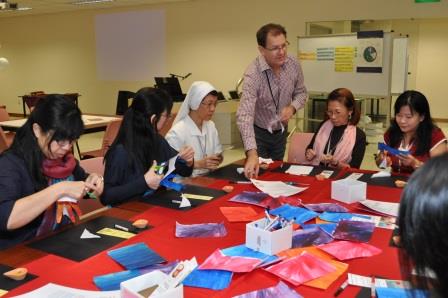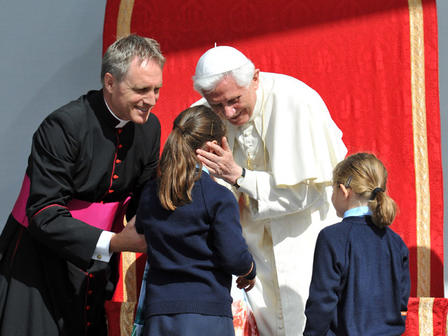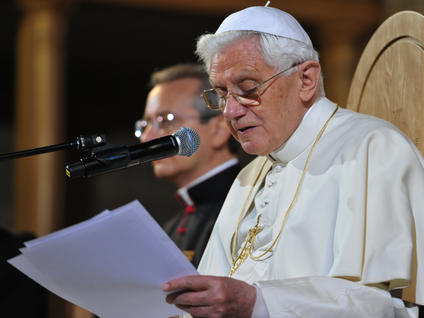Dear Principals, Vice-Principals and Heads of Department in our Catholic Schools,
Greetings for the New Year! My prayers and blessings on all of you as you begin a new academic year.
On the occasion of the World Day for Peace on January 1st our Pope Benedict has dedicated his message to peace which he connects closely to religious freedom. He says “The right to religious freedom is rooted in the very dignity of the human person, whose transcendent nature must not be ignored or overlooked. God created man and woman in his own image and likeness (cf. Gen 1:27). For this reason each person is endowed with the sacred right to a full life, also from a spiritual standpoint. Without the acknowledgement of his spiritual being, without openness to the transcendent, the human person withdraws within himself, fails to find answers to the heart’s deepest questions about life’s meaning, fails to appropriate lasting ethical values and principles, and fails even to experience authentic freedom and to build a just society.”
I would like to reiterate with the Pope, the importance of the Spiritual and Ethical dimensions of human life and the importance of religious freedom which is to be exercised appropriately. As we begin a new school year I pray that all our Catholic Schools remember that we have a duty and a right to nurture our Catholic identity for the benefit of all our students.
Many of you have requested that the Catholic Church teachings be clarified in the area of Pre-Marital Sex and Contraception in the context of the sexuality programmes that are taught in our schools.
Firstly, we acknowledge that we live in a secular society where no specific religious group has the right to impose its beliefs on others. Within the context of our Catholic Schools however I would find it unacceptable if students were given a compromised message on pre-marital sex. This applies to all students in the school.
Secondly, we are very concerned with the increasing incidence of sexually transmitted infections among students caused by young people indulging in sexual activity with multiple partners. We would like to collaborate with the Health Promotion Board to do whatever is best for our young people in this regard.
We are convinced that the solution to our problems is not to compromise but to remain faithful to what has been proven beneficial to the human person and supports the dignity and sacredness of human love and life. As you have asked for a statement on the Church’s teachings I have prepared some paragraphs below for you to study and apply in sexuality education programmes that are to be delivered in our schools.
The Church’s official teaching
The official teaching of the church regarding sexual intercourse (the marital act) and contraception has been consistently taught both in the tradition and in the official Magisterium of the church.
Pius XI in 1930 wrote in the encyclical Casti Connubi: “any use whatsoever of matrimony exercised in such a way that the act is deliberately frustrated in its natural power to generate life is an offense against the law of God and of nature, and those who indulge in such are branded with the guilt of a grave sin.” (CC 56).
At the time, this teaching was simply unquestioned and accepted by a church and culture that appreciated the value of fertility and offspring. The “sexual revolution” of the 60’s sought to question traditional sexual values and behavior while the invention of oral contraceptives made some theologians raise new questions on the traditional teaching of the church regarding contraception.
After much debate, in 1968 in the after-math of the Second Vatican Council, Pope Paul VI published the encyclical Humanae Vitae reiterating the previous position of the church: “The Church… teaches that each and every marital act must of necessity retain its intrinsic relationship to the procreation of human life.” (HV 11) In another place it reads “every action which… proposes whether as an end or as a means, to render procreation impossible is intrinsically evil” (HV14).
This teaching has been reaffirmed by John Paul II in his Apostolic Exhortation of 1981,Familiaris Consortio and offered to the faithful in the teachings of the ‘Catechism of the Catholic church’ as follows: “the two meanings or values of marriage cannot be separated without altering the couple’s spiritual life and compromising the goods of marriage and the future of the family” (CCC 2362).
Two things we should stress from these texts: First, there is no mention of any particular means of contraception, since what is at stake is not the method used or whether this method is natural or artificial. What is at stake is the moral act of contraception. Thus, whether the choice to contracept is done through the use of condoms, oral hormones, behavior (such as the “so called” withdrawal method) or simply a general attitude or mentality against the conception of a child, what spouses choose to do is to render their marital life sterile.
A second point we need to stress is this teaching concerns marital acts, since marital acts are the only ethical sexual acts in the eyes of the church. The teaching of the church is concerned with the faithful preservation of the teachings of Jesus Christ and its application in different times and places to assist Christians to lead lives consistent with their status as children of God.
If we present to our young people how to use the condom outside marriage, just in case you need it, it would be as though the church is teaching us how to sin less grievously which makes no sense. Thus, we do not find official teachings of the church on the uses of contraceptives in extramarital or homosexual sex.
So far, we have sought to clarify the stand of the church regarding contraception. The question remains though whether it would be better to use contraceptives in cases of unethical sexual intercourse for the sake of preventing a contagion of diseases. There is no official teaching of the church on this point and we are left to the discussion of theologians and other authorities on this point.
The use of condoms
First of all, we must note that condoms, even if invented or commonly used to prevent the transmission of life, are now also used to prevent the transmission of death. Condoms in that sense would not be primarily an instrument of contraception but an instrument of prevention of the spread of a disease. In fact, condoms, when used in homosexual acts, cannot be contraceptive at all, since the homosexual act is never a conceptive act in the first place.
So, even when extra-marital sex is intrinsically wrong, wouldn’t it be better that these wrong acts, would be rendered “less irresponsible and dangerous” by protecting the participants of the sexual act with a condom? Bishop Anthony Fisher, Australian Bishop and a member of the Pontifical Academy for Life, thinks so: “Whether and when condoms are effective for preventing disease transmission is complex (…). But prima facie, while extra-marital intercourse is always wrong because it is unchaste, the intention of reducing the danger to health by wearing a condom is a good one and the actual act is indifferent.”
However, his argument does not conclude there. He continues: “On the other hand, insofar as using a condom lends a true – or, more likely, false – sense of security to sexual activity it may make the user more likely to engage in wrongful intercourse and so condomizing intercourse can aggravate the wrong. As such, the activity becomes habitual it further clouds people’s understanding of sexuality, and accustoms them to ways of thinking and relating that will make it more difficult for them ever to enter profoundly into marital communion. Condoms may be ‘safer’ but they certainly do nothing for people’s chastity!” [Anthony Fisher, Cooperation, Condoms and HIV (Henkels Lecture for Bioethics Symposium on Moral Conviction vs Political Pressure, Institute of Bioethics at Franciscan University of Steubenville, Ohio USA)]
Some theologians argue that if contraception is wrong in itself, couples who engage in the sexual act outside marriage, when they use contraceptives are in fact adding a new wrong to their already wrong act of extra-marital sex.
Another debated issue is whether married couples could use condoms if one partner is infected with the HIV virus. Cardinals and other ecclesiastical authorities have defended condom use by married couples to prevent transmission of HIV. Examples of these are Carlo Cardinal Martini, Cardinal Javier Lozano Barragán, former president of the Pontifical Council for Health Care Workers, Cardinal Danneels of Belgium and George Cottier, O.P., former theologian to John Paul II.
The opposite opinion is also held that such acts would not be true marital acts, since they would prevent the act from being fully a sexual marital act because it precisely prevents its consummation.
Recently, in the book-interview “Light of the World”, the Pope made some comments regarding the seemingly responsible use of condoms by male prostitutes. The Press understood this as an exception to the normal policy of the church against condoms and a possible change of vision in the church’s doctrine on contraception. The Press has spread this message far and wide, without much clarity.
The statement of Benedict XVI commenting on the special case of “male prostitutes” is not one more opinion on either side, but a deeper statement. He sees in the undeniably good intention of the prostitute a “movement towards the good” even within the wrongness of the act. The statement of the Pope goes beyond the individualistic morality of the case per se towards a more holistic approach.
Conclusion
I am deeply grateful to all of you for your care of the young and their moral and spiritual development as well as their intellectual and physical growth. My prayers accompany all your efforts.
Let us have the courage of our convictions and bring true education and values into sexuality and all other subjects and aspects of school life.
Your brother and friend,
+Archbishop Nicholas Chia
10 January 2011



